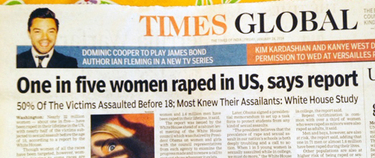I woke up the other day to a photo from a friend who lives in north India. It was a headline from The Times of India, and it read in thick bold font "One in five women raped in US"; it was an eye catching statement on the front of their "Global" section, sitting right above the fold.
Now my friend is a very proud Indian, and rightfully so, he comes from a country that in 2013 alone did everything from put a rocket into space to double their solar output. Yet, these socially progressive feats are still repeatedly marred on the international stage by a continually unaddressed "elephant in the room," and sending me a headline that attempts to show India's rape problem in comparison to that of another countries' does little to convince me that "things are hyper-inflated."
For many Americans, the frequency and brutality of rapes and sexual assaults in India was largely unknown until the infamous "Delhi Rape Case." An incident in which a 23-year-old girl was gang raped and murdered in Delhi, the National Capital of India.
This recent headline is just one of many I have seen coming out across the country in various media outlets. The Indian media used to downplay or wholly ignore the occurrence and frequency of these attacks domestically... until recently, when we have started to see a rising trend in "international coverage" coming from the potential superpower.
On my most recent trip to India, I spent some time in a village outside of Lucknow, the capital city of Uttar Pradesh. While there, I was fortunate enough to have the opportunity to sit down and interview some of the young women living in the village. During our dialogues, I kept noticing that an alarming thread of commonality between them all was this mutual feeling of helplessness; both physically and politically. In a country whose local justice system's are so infested with corruption, the vast majority of attacks are never reported because many of the survivors believe that nothing will be done. Below is a "statistic" taken from The India Tribune
Number of rapes per year in America: 89,241
Number of rapes per year in India: 21,397
The Indian media seems to buy into this logical fallacy that a lack of reported rapes is indicative of a lack of sexually based crimes, and they have started trying to downplay their own issues in relations to those of other countries instead of addressing the issues of rape, sexual assault, and gender inequality happening in their own back yard.
By attempting to compare their sexual assault problems in relation to the world's, they begin to domestically normalize this growing pandemic. This is that elephant in the room. The international scene knows this is an issue, but by choosing to downplay this problem, they are not only allowing it to perpetuate itself, they are allowing it to get worse.
The first step to tackling such a large domestic problem like this is to acknowledge how big it really is. What might try to be "legitimate reporting" continues to come across as just another attempt to focus national attention away from their government's inability to address their own issues at home. The Indian media needs to focus their attention more on highlighting a real and growing problem, and less time trying to convince its citizens that things are not as bad as they seem.

